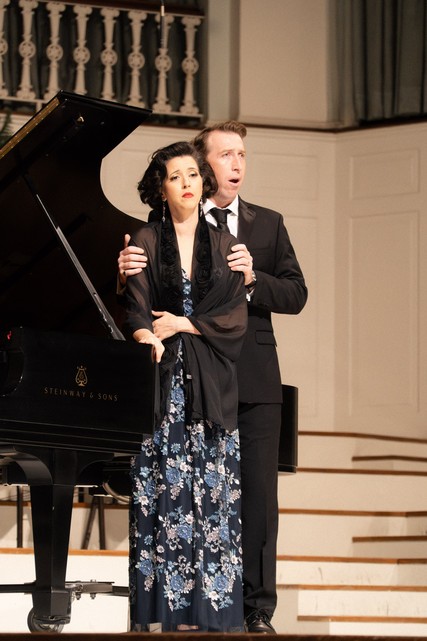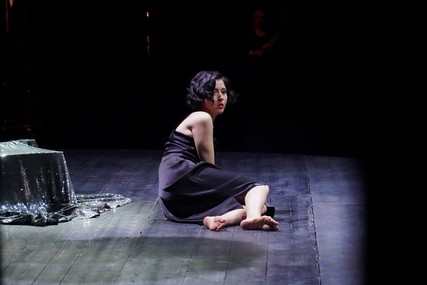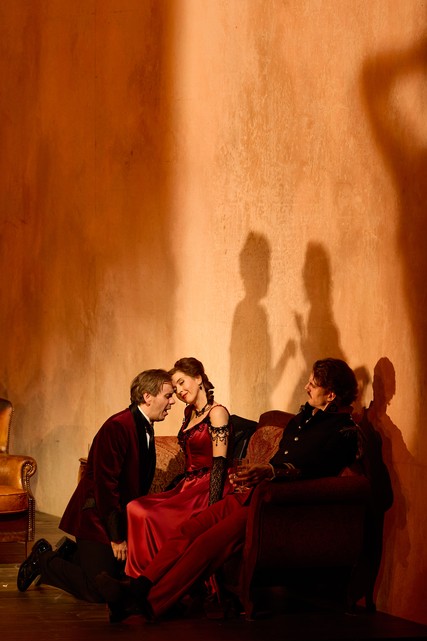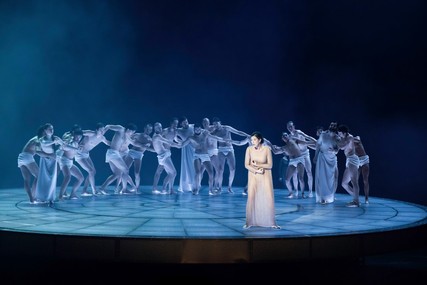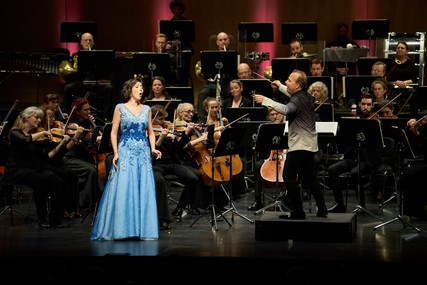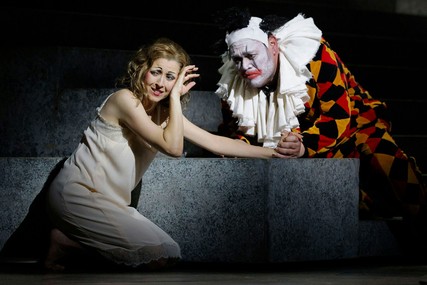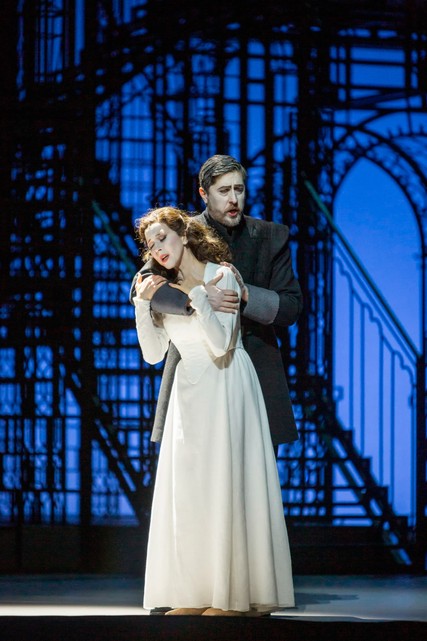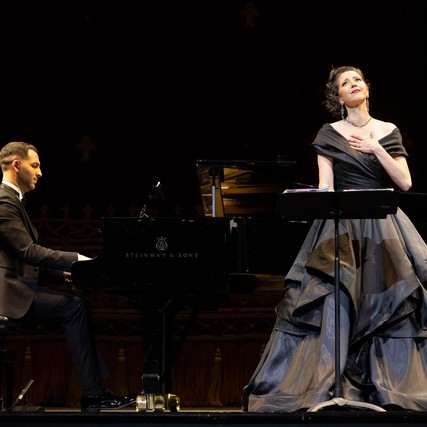2025
Opera Louisiane - Concert
Bayerische Staatsoper - La traviata
Nov, 2025Prima Traviata assolutissima, Lisette Oropesa mène le bal dans la reprise de la Traviata à Munich
C’est justement pour la musique et pour le chant que le public s’est déplacé, et surtout pour entendre une nouvelle fois l’incomparable Lisette Oropesa, une chanteuse constellée dont Violetta est l’un des rôles fétiches. La soprano colorature a soulevé l’enthousiasme du public tout au long de la soirée, son interprétation est soutenue par une technique remarquable qui lui permet d’exprimer sans défaut toutes les facettes du rôle : la joie insouciante et l’élan passionné, la fragilité du corps et du cœur, la maladie et la misère, le renoncement et la grandeur morale, le désespoir et l’agonie. La palette émotionnelle complexe de la traviata (la dévoyée) est rendue avec une maîtrise impeccable. Totalement engagée dans le rôle, la chanteuse se fond dans son personnage auquel elle confère une aura lumineuse incandescente dont elle irise tout le lyrisme dramatique. La passion amoureuse la consume tout autant que la maladie qui la ronge. Lisette Oropesa apporte la beauté rayonnante de sa voix à une interprétation d’une authenticité émotionnelle poignante. La palme revient à Lisette Oropesa, qui domine toute la production et nous entraîne dans d’autres sphères, lumineuses et lointaines, dont les beautés sublimes transcendent le monde abyssal du sacrifice auquel son personnage est exposé.It is precisely for the music and for the singing that the audience gathered, and above all to hear once again the incomparable Lisette Oropesa, a stellar singer whose Violetta is one of her signature roles. The coloratura soprano sparked enthusiasm from the audience throughout the evening, her performance is supported by a remarkable technique that allows her to flawlessly express all facets of the role: carefree joy and passionate fervor, the fragility of body and heart, illness and poverty, renunciation and moral greatness, despair and agony. The complex emotional palette of the traviata (the wayward woman) is rendered with impeccable mastery. Fully immersed in the role, the singer merges with her character whom she endows with a radiant incandescent aura that illuminates the whole dramatic lyricism. Love consumes her as much as the illness that eats away at her. Lisette Oropesa brings the radiant beauty of her voice to an interpretation of poignant emotional authenticity. The top honors go to Lisette Oropesa, who dominates the entire production and transports us to other spheres, bright and distant, whose sublime beauties transcend the abyssal world of sacrifice to which her character is exposed.— Luc-henri Roger • Résonances LyriquesStaatsoper Berlin - Roméo et Juliette
Oct, 2025 - Nov, 2025Berlin: “Roméo et Juliette”, Charles Gounod
Lisette Oropesa war nun die Juliette und überraschte mit totaler Aneignung von Cléments Regiekonzept samt zweifelhafter Personenführung. Ihr Sopran besitzt eine individuelle Farbe und den gebührend leuchtenden, jugendlichen Klang für die Rolle. Die Koloraturen in „Je veux vivre“ perlen vollendet, die zweite, sogenannte „Gift“-Arie („Dieu! quel frisson“) singt sie mit Emphase und dramatischem Impetus.Lisette Oropesa was now Juliette and surprised with a complete embrace of Clément's stage concept alongside questionable direction of the characters. Her soprano possesses an individual tone color and the appropriately luminous, youthful sound for the role. The coloratura in "Je veux vivre" sparkles perfectly, and she sings the second, so-called "poison" aria ("Dieu! quel frisson") with emphasis and dramatic momentum.— Bernd Hoppe • Der Opern FreundStaatsoper Berlin - La traviata
Oct, 2025„La Traviata“ Unter den Linden: Ein Staraufgebot erfüllt die hohen Erwartungen
In der Derniere der Serie feierte Lisette Oropesa ihr überfälliges Hausdebüt, die Sängerin mit kubanischen Wurzeln genießt international bereits Starruhm. Wie berechtigt dieser ist, war schon nach wenigen Minuten klar. Oropesas gut geführter lyrischer Sopran verfügt neben einem sehr ansprechenden Timbre über eine bemerkenswerte Phrasierungskunst. Da wird keine Silbe, keine Phrase dem Zufall überlassen, die Sängerin gestaltet intensiv und gibt der Violetta ein ganz persönliches, individuelles Profil. Dass der Spitzenton in der großen Arie des ersten Aktes ein wenig forciert wirkt – geschenkt! Spätestens als Sterbende reiht sich Oropesa in die großen Interpretinnen dieser Rolle ein. Die drei Hauptdarsteller wurden frenetisch gefeiert, der Beifall für Oropesa erreichte Orkanstärke.In the final performance of the series, Lisette Oropesa celebrated her long-awaited house debut. The singer with Cuban roots already enjoys international star status. The justification for this was clear within minutes. Oropesa's well-guided lyric soprano, in addition to a very appealing timbre, possesses remarkable phrasing artistry. Not a syllable, nor a phrase is left to chance. The singer passionately shapes and gives Violetta a very personal, individual profile. Even if the high notes in the big aria of the first act sound a bit forced – no matter! By the time she is in her death throes, Oropesa joins the great interpreters of this role. The three main performers were celebrated ecstatically, with applause for Oropesa reaching hurricane force.— Peter Sommeregger • Klassik BegeistertOpernhaus Zürich - Manon
Sep, 2025 - Oct, 2025Zürich, Opernhaus: MANON; 24.09.2025
Lisette Oropesa IST Manon mit jeder Faser, jeder Mimik, jeder Geste und mit einer stupenden vokalen Rollengestaltung. Die Stimme leuchtet, brennt, kennt Leidenschaft, Trauer, Stimmungsschwankungen und ist von immenser Kraft, ohne jegliches Forcieren. Da ist eine tiefe Empfindsamkeit zu verspüren, eine Jugendlichkeit, eine Unerschrockenheit, aber auch Wehmut und Selbstvorwürfe und vor allem ein Verständnis für und eine Liebe zu dieser Figur. Das ist weniger kalkulierende femme fatale als vielmehr einfach eine junge Frau an der Schwelle zum Erwachsenwerden, welche für ihre Fehler bitter bezahlen muss.Lisette Oropesa IS Manon with every fiber, every facial expression, every gesture, and with a stunning vocal characterization. Her voice shines, burns, knows passion, sadness, mood swings, and possesses immense power, without any forcing. One can feel a deep sensitivity, youthfulness, fearlessness, but also wistfulness and self-blame, and above all, an understanding of and love for this character. She is less of a calculating femme fatale and more simply a young woman on the brink of adulthood, who must pay dearly for her mistakes.— Kaspar Sannemann • Oper AktuellArena di Verona - Rigoletto
Sep, 2025Rigoletto – Arena di Verona Opera Festival 2025, Verona
Grande sorpresa ci ha colti nell’apprendere, pochi giorni prima della recita, dell’arrivo, nella città scaligera, del celebre soprano Lisette Oropesa. Si rimane colpiti, anche in questa occasione, dalla musicalità e dalla duttilità di una vocalità sempre sorvegliata e guidata da un presidio tecnico di eccellente precisione. Alla pienezza dei centri, segue un registro superiore che si articola attraverso lamine di suono di cristallina purezza.A great surprise caught us when we found out, just a few days before the performance, about the arrival, in the city of Verona, of the renowned soprano Lisette Oropesa. One remains impressed, even on this occasion, by the musicality and flexibility of a vocal range always supervised and guided by a technical mastery of excellent precision. The fullness of the sound centers is followed by an upper register that is articulated through layers of sound of crystalline purity.— Marco Faverzani • Opera LiberaSalzburger Festspiele - Maria Stuarda
Jun, 2025 - Aug, 2025Rasche kreist, Oropesa triumphiert
In gleißendem Weiß steht ihr Lisette Oropesa gegenüber, stimmlich aber klingt das wunderbar warm und körperhaft. Die Spitzentöne und die Koloraturen hat sie sicher. Aber noch stärker als in der Akrobatik ist sie im Ausdruck: Wenn sie liebt und leidet, ist sie bei sich und wir sind bei ihr. Eine fantastische Sängerin!In gleaming white stands Lisette Oropesa, but vocally she sounds wonderfully warm and full-bodied. She handles the high notes and coloratura with certainty. However, her strength lies even more in expression than in acrobatics: when she loves and suffers, she is true to herself and we are with her. A fantastic singer!— Bernhard Neuhoff • BR KlassikBayerische Staatsoper - I Masnadieri
Jul, 2025When Poe met Schiller
Amalia is Cuban‑American soprano Lisette Oropesa. She debuted in this role at La Scala in David McVicar’s aforementioned production. Her interpretation of the aria was spot on, initially sad and then brilliantly joyous in the cabaletta, with clean coloratura and brilliant high notes. Despite the poor staging and the confusing younger versions of Carlo, Francesco and Amalia that appear intermittently throughout, Oropesa managed to convey Amalia’s nobility and strength of character.— Ossama el Naggar • Concerto NetFestspielhaus Baden Baden - Concert
Los Angeles Opera - Rigoletto
May, 2025 - Jun, 2025An extraordinary night of music and drama: Quinn Kelsey in LA Opera’s Rigoletto
Oropesa navigated the transition from innocence to maturity both in her stage presence and voice, moving from lyric coloratura to dramatic soprano which distinguishes her altered state.— Jane Rosenberg • Seen and Heard InternationalOpéra Royal du Château de Versailles - Alcina
Apr, 2025Alcina, Furieuse magicienne à Versailles
L'américano-cubaine Lisette Oropesa, est magnétique dans le rôle principal d'Alcina, sœur de Morgana. La grande voix de la soprano léger, parée d'une robe bleu azur scintillante, donne toute sa complexité au rôle de la magicienne maudite. Toutes ses interventions sont riches d'un jeu d'actrice subtil et mesuré, engagé jusque dans sa posture. Sa voix puissante au reconnaissable vibrato rapide reçoit des acclamations. Elle convainc en amoureuse souriante, tout comme en magicienne, reine, femme, dévastée et plaintive, sa technicité lui permettant de mettre un effet « éraillé » sur sa voix. Des intervalles vertigineux au souffle dramatique, les frissons gagnent la salle à maintes reprises : la voix, solidement ancrée dans la poitrine, s'élève sans effort apparent et c'est ainsi qu'elle enchaîne les vocalises avec une virtuosité ensorcelante.The Cuban-American soprano Lisette Oropesa is magnetic in the main role of Alcina, sister of Morgana. The great light soprano voice, adorned in a sparkling azure blue dress, brings all the complexity to the role of the cursed sorceress. All her interventions are rich in subtle and measured acting, engaged even in her posture. Her powerful voice with a recognizable fast vibrato receives acclaim. She convinces as a smiling lover, as well as a sorceress, queen, woman, devastated and plaintive, her technique allowing her to put a "gritty" effect on her voice. From dizzying intervals to dramatic breaths, shivers sweep through the audience repeatedly: the voice, firmly rooted in the chest, effortlessly soars, enchanting with its virtuosic vocal acrobatics.— Olga Szymczyk • OlyrixNBS - Concert
Apr, 2025Opéra National de Paris - I Puritani
Jan, 2025 - Mar, 2025Lisette Oropesa, grande Elvira dans la reprise des « Puritains » à l’Opéra de Paris
Son retour à l’acte II avec le « O rendetemi la speme » confirme son extraordinaire appropriation du rôle et la sensibilité avec laquelle elle livre ces airs magnifiques, s’appuyant sur son médium moelleux, dispensant de somptueux aigus piani filés. Elle assure ensuite crânement le « Vien, diletto, è in ciel la luna ! », en lien avec le chef qui joue des rythmes pour faire de l’air toute autre chose qu’un passage purement virtuose. Ses interventions finales parachèvent enfin le parcours de cette héroïne qu’elle a menée à bon port malgré les écueils, et a finalement transcendé, en alliant virtuosité et sensibilité, et en rendant hommage à la difficile, mais si belle, écriture bellinienne.Her return in Act II with the aria "O rendetemi la speme" confirms her extraordinary embodiment of the role and the sensitivity with which she delivers these magnificent arias, relying on her velvety middle range, providing sumptuous high piani filés. She then boldly performs "Vien, diletto, è in ciel la luna!" in connection with the conductor who plays with rhythms to make the aria something other than simply a virtuosic passage. Her final interventions finally crown the journey of this heroine whom she has brought safely home despite the obstacles, and has ultimately transcended, by combining virtuosity and sensitivity, and paying tribute to the challenging, yet beautiful, bel canto style of Bellini.— Paul Fourier • Cult.newsOpéra National de Paris - Gala anniversaire
Jan, 2025Gala anniversaire. 150 ans du Palais Garnier, 24 janvier 2025
Lisette Oropesa Mathilde souveraine, affichant un sens du phrasé unique, une élocution parfaite, un legato glorieux, bref une maîtrise sans faille du style rossinien.Lisette Oropesa, a sovereign Mathilde, displays a unique sense of phrasing, perfect elocution, glorious legato, in short, an impeccable mastery of the Rossini style.— Camillo Faverzani • Premiere Loge OperaStaatsoper Hamburg - Recital
Jan, 2025Staatsoper Hamburg: Ein kleines Lied sagte mehr als tausend Töne
„Im wunderschönen Monat Mai“, aus dem „Dichterliebe“-Zyklus. „Als alle Knospen sprangen/da ist in meinem Herz/die Liebe aufgegangen.“ Hier hing es um was, jenseits und vor allem: weit unterhalb der Koloraturen. Womöglich das Schwerste an diesem Abend für diese Sängerin, weil es so einfach zu klingen hat."In the beautiful month of May," from the "Dichterliebe" cycle. "When all the buds were bursting/ then in my heart/ love sprung up." Here staked something, beyond and above all: far beneath the coloraturas. Possibly the hardest thing on this evening for this singer, because it has to sound so simple.— Joachim Mischke • Hamburger AbendblattTeatro di San Carlo - Recital
Jan, 2025Naples, Oropesa/Praticò concert, 01/09/2025
Si apprezzano nell’interpretazione di Lisette Oropesa la cavata e l’afflato lirico, l’abbandono alla elegante cantabilità delle melodie di Mercadante, l’irrobustimento del peso specifico della sua vocalità, che in queste pagine anticipa, in un recital dalla coerente e ben ponderata scelta dei brani, quella appropriata alle quattro successive romanze da camera di Giuseppe Verdi, È la vita un mar d’affanni, Stornello, Chi i bei dì m’adduce ancora, Perduta ho la pace. La lettura di queste quattro pagine è un microcosmo di stati d’animo, di fraseggio ricercato, un esempio di versatilità. Qui Lisette Oropesa riesce a trovare la “tinta” più appropriata per ciascuna romanza, la giusta accentazione, la migliore prosodia per ogni parola.One appreciates in Lisette Oropesa's interpretation the flourish and lyrical inspiration, the surrender to the elegant singability of Mercadante's melodies, the strengthening of the specific weight of her vocals, which in these pages anticipates, in a recital from the coherent and well-considered selection of pieces, that appropriate for the four subsequent chamber romances by Giuseppe Verdi, Life is a sea of troubles, Stornello, Who brings me the good days again, I lost my peace. The reading of these four pages is a microcosm of emotional states, of sought-after phrasing, an example of versatility. Here Lisette Oropesa manages to find the most suitable "shade" for each romance, the right accentuation, the best prosody for each word.— Luigi Raso • L'ape musicaleTiroler Festspiele Erl - I Puritani
Jan, 2025Erl, Tiroler Festspiele – I puritani (con Lisette Oropesa e Mattia Olivieri)
Sugli scudi, due degli interpreti principali. Lisette Oropesa, che canterà prossimamente il ruolo a Parigi, ha fatto sensazione con un canto che, senza insistere troppo su sopracuti, messe di voce e ornamentazioni aggiunte, mirava soprattutto a restituire un vero personaggio. In una prestazione di simile livello, le va riconosciuta una scena della pazzia del secondo atto memorabile anche per la gestualità, non condizionata per una volta dallo spartito sul leggio. Peccato che non si eseguisse il finale scritto per la Malibran, ma la polacca, i duetti con basso e tenore, e il suo “Ah vieni al tempio” (uno di quei momenti dove la musica di Bellini tocca il cielo e i cuori) verranno ricordati e giustamente.On the shields, two of the main performers. Lisette Oropesa, who will soon perform the role in Paris, made a sensation with her singing, which, without dwelling too much on high notes, messa di voce, and added ornamentations, aimed primarily at embodying a real character. In such a high-level performance, she deserves recognition for a scene of madness in the second act, memorable even for its gestures, not conditioned for once by the score on the music stand. It's a pity that the finale written for Malibran was not performed, but the polonaise, the duets with the bass and tenor, and her "Ah vieni al tempio" (one of those moments where Bellini's music touches the sky and hearts) will be remembered and rightfully so.— Jorge Binaghi • Conessi all'Opera

